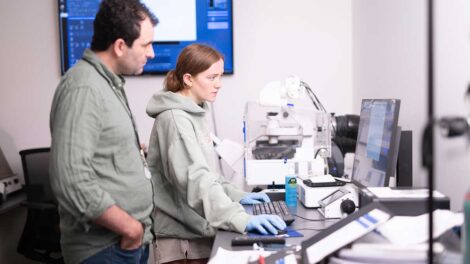Celebrating faculty: Manuel Ospina-Giraldo

Manuel Ospina-Giraldo, professor of biology
What is the focus of your research?
I am a plant pathologist (also known as a phytopathologist), a type of scientist who studies plant diseases. I study how certain microbial agents (which we refer to as “pathogens”) cause diseases on potato, tomato, and soybean plants. These pathogens are called “oomycetes”; they are fungal-like organisms that penetrate the plant, colonize it, and destroy the plant tissue, leading to major agricultural losses.
The focus of my research is an oomycete that causes the disease known as potato late blight, a major contributor to the Irish Potato Famine. Potato late blight is still a significant agricultural problem today, causing over $6 billion in yearly losses worldwide. Specifically, I’m investigating what genes enable this oomycete to degrade the plant cell wall (the major protective plant barrier), enter the cell, and kill the plant. All these studies are conducted at the molecular level.
How do students benefit from your scholarship and research?
First of all, students get the opportunity to receive actual hands-on training on state-of-the-art techniques and instruments used in molecular plant pathology. But most importantly, they get trained in the use of the scientific method: how to formulate a hypothesis based on actual observations and how to design an experiment to test a hypothesis. During their time in my laboratory, students also develop strong analytical and writing skills; most students in my laboratory have been co-authors on published manuscripts.
What will you be teaching in the fall?
I’ll be teaching two courses that, in principle, couldn’t be more different from each other: BIOL 215: Phytopathology and one of my First-Year Seminar courses, FYS 025: Fútbol: Inside the Beautiful Game.
Phytopathology aims at providing the foundational concepts on the study of plant pathogens. We talk about the main microbes that cause plant diseases, but we also discuss the economic and social impact of plant diseases, their relevance to humankind, and how plant diseases have changed the structure of societies around the world.
In the course, I hold three roundtable discussions, called “Disease of the month: Plant diseases and human migrations,” on three plant diseases that have changed several societies forever. These include coffee rust, which, with a significant role played by the English, devastated Ceylon (Sri Lanka, today) in the early 1800s; potato late blight, which, again, mostly driven by the English ownership of the Irish land and the their economic policies toward the Irish, halved the Irish population in the mid-1800s; and Panamá disease of banana, which, with the exclusive participation of the United States, led to the overthrow of democratically elected governments, the creation of criminal paramilitary groups, the poisoning and displacement of entire populations in Latin America, and the coining of the unfortunate moniker “Banana Republic” in the 20th century.
I developed FYS 025 over a period of two years in a process that involved conversations with the Writing Center and FYS program directors, Lafayette men’s and women’s soccer team coaches, faculty members in several Lafayette departments, and bestselling authors in the soccer world. I purposely used the “spanishized” word “fútbol” in the course title to highlight the role of soccer on national identity. In this class, we discuss the economics of the soccer player trade business, soccer’s impact on climate change, the social implications of soccer, its role in ethnic and national identity, and other topics such as racism, homosexualism, gender bias, sectarianism, and xenophobia.
Read more about faculty members newly named full professors.

